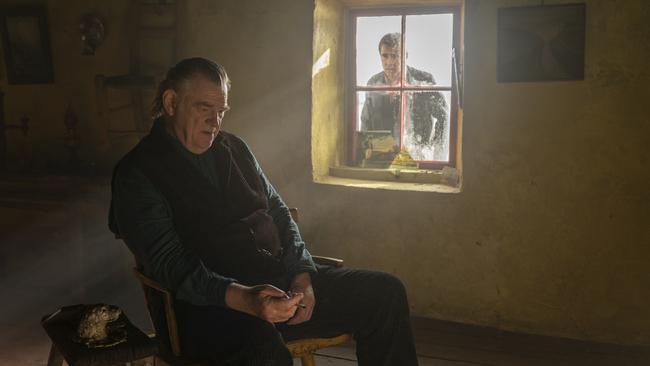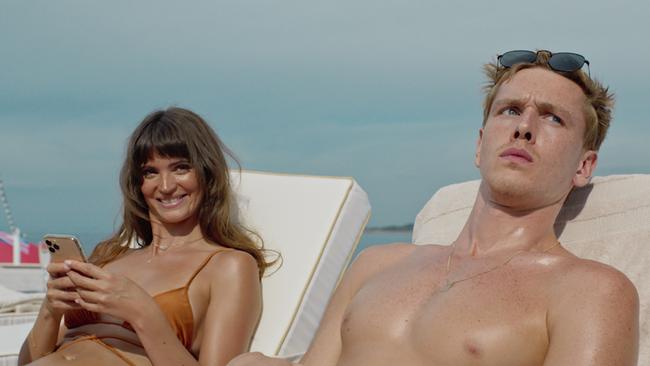The Banshees of Inisherin, McDonagh’s sublime tale of death of friendship
The Banshees of Inisherin, starring Colin Farrell and Brendan Gleeson as a couple of friends who have a falling out, is the best film of 2022.

The Banshees of Inisherin (M)
In cinemas from Boxing Day
★★★★★
According to Irish folklore, a banshee is a female spirit whose wailing heralds a death. In Irish director Martin McDonagh’s masterly The Banshees of Inisherin there is, despite the plural title, just one banshee – an old woman named Mrs McCormick (Sheila Flitton) who acts as a sinister observer, or chorus, to the dramatic events unfolding on this small island off the Irish coast.
The year is 1923. On the mainland the Civil War that followed the War of Independence and the establishment of the Irish Free State is being waged between the provisional Irish government and the IRA.
The inhabitants of Inisherin can hear the gunfire from afar, but they seem disinterested in the conflict; who is being executed, members of the IRA or members of the government? It doesn’t seem to matter much. But this dimly understood conflict can be seen as a backdrop to a more personal conflict on the island itself – the falling-out of two best friends, Padraic (Colin Farrell) and Colm (Brendan Gleeson),
For years Padraic, a farmer who lives in a small cottage with his older sister, Siobhan (Kerry Condon), has joined his older mate Colm, a musician, in the local pub at two in the afternoon. But suddenly and unexpectedly this friendship is ended by Colm. One afternoon, when Padraic calls at his friend’s house as usual, Colm refuses to come to the door; in the pub, he won’t sit and drink with Padraic and, what’s worse, he won’t say why. Are they rowing? Padraic, not the brightest of men, doesn’t think so, and he’s deeply upset.
When he does discover why Colm has turned against him he still doesn’t understand. “In 12 years I’ll die with nothing to show for it but aimless chattering,” says Colm. He has come to the conclusion that his friend is dull, that their conversations are boring, and that time is slipping away.
Thus the premise of this warmly human, quietly humorous and genuinely touching film is the breakdown of a friendship and the ramifications of that breakdown. The story of Padraic and Colm unfolds in the spectacularly beautiful surroundings of the island with its majestic seashores, dry stone walls, narrow lanes and stone thatched cottages. The other islanders, who are witness to the rift between the two friends, all have important contributions to make. They include Jonjo (Pat Shortt), the barman at the pub that is the focus of social life; Mrs O’Riordan (Brid Ni Neachtain), the nosy shopkeeper and postmistress, who reads other people’s mail and is always eager for the latest news; the brutish local policeman (Gary Lydon) and his defeated son, Dominic (Barry Keoghan); and the priest (David Pearse) who comes to the island on Sundays to conduct a service in the little church and to hear confessions.
Above all there is Siobhan, who seems like a fish out of water in this isolated community. Unlike most of the other inhabitants of Inisherin, she reads books and she has plans to leave the island and explore the outside world. Dominic is another key character; badly treated by his father, he latches on to Padraic and even timorously attempts to romance Siobhan, who gently and kindly rejects him.
Animals play an important role on Inisherin. Padraic is devoted to his donkey, Colm to his dog. Now that he no longer hangs out with Padraic, Colm spends his time composing tunes on his fiddle and playing music at the pub. But when he becomes exasperated with Padraic constantly bothering him to resume the friendship he takes very drastic action.
Farrell, who won the Best Actor prize at Venice in September, and Gleeson are both beyond praise; in fact it would be difficult to say which of them gives the better performance. They both appeared in the first film playwright McDonagh directed, In Bruges (2008), as a couple of hitmen. Banshees also won the Best Screenplay award in Venice – the same award McDonagh won in 2017 with his previous film, Three Billboards Outside Ebbing Missouri.
But The Banshees of Inisherin is not just a beautifully written screenplay. This deeply affecting, warmly humorous, beautifully acted and handsomely photographed (by Ben Davis) film is a major work and top of my list for the best film of 2022.
-
Triangle of Sadness (M)
In cinemas from Boxing Day
★★★½
The Square (2017) won the Palme d’Or in Cannes and so, this year, did Ruben Ostlund’s new film, Triangle of Sadness, a very broad satire on the lives of the rich and the greedy.
The film is divided into three parts plus a prologue – a rather unnecessary prologue in which Carl (Harris Dickinson) is introduced among a group of male models being auditioned. Chapter 1, “Carl and Yaya” (Yaya is played by Charlbi Dean), is set in a smart restaurant where the two handsome models have just enjoyed a meal. But then they quarrel over which of them was paying for it — they’re a couple, but an uneasy one.
Nevertheless, in Part 2, “The Yacht”, they’re (freeloading) passengers on a top-class cruise ship where the intricate arrangements to please all the wealthy guests are efficiently organised by Paula (Vicki Berlin).

The other passengers include Russian oligarch Dimitri (Zlatko Buric) who is travelling with his wife, Vera (Sunnyi Melles), and his mistress, Ludmilla (Carolina Gynning); Jarmo (Henrik Dorsin), a suave millionaire who flirts with Yaya and Ludmilla at the ship’s bar; and a pleasant elderly British couple (Amanda Walker, Oliver Ford Davies) who, we discover, made their fortune from manufacturing armaments. The yacht’s Captain (Woody Harrelson) is permanently drunk and keeps to his cabin – until the Captain’s dinner, for which he finally emerges. The scene that follows is played for broad comedy as a sudden storm plays havoc with the passengers who, until then, have been enjoying some fine dining.
Meanwhile, Dimitri and the Captain exchange political aphorisms (“The last capitalist we hang will be the one who sells us the rope” – Karl Marx).
Chapter 3 is titled “The Island” and at this point Ostlund appears to be borrowing the theme of J.M. Barrie’s 1902 play The Admirable Crichton (filmed in 1957), in which an aristocratic family is shipwrecked on a desert island and has to rely on their servants to feed and organise them.
In Triangle of Sadness, eight of the yacht’s passengers are marooned and it’s Abigail (Dolly de Leon), who was in charge of the toilets on the yacht, who assumes control because she’s the only one who can get things done.
The film is excessively long (the opening section could well have been dispensed with, though it provides the film with its title – the “triangle of sadness” refers to the worry lines on the face) but the satire is incisive and often funny, even though the objects of derision are pretty obvious ones (beautiful people, the rich and corrupt).
There’s an interesting cast of mostly unknown actors (Harrelson excepted) and the film is very well staged. Maybe the Cannes accolade was a bit on the generous side, though.




To join the conversation, please log in. Don't have an account? Register
Join the conversation, you are commenting as Logout